Aelius Nicon was a Greek architect and builder in 2nd century AD Pergamon. Nicon is known as the father of the ancient anatomist and philosopher, Galen.
Nicon was a mathematician, architect, astronomer, philosopher, and devotee of Greek literature. Nicon closely supervised Galen's education and tutored him at home, intending his son to study philosophy or politics. However, according to Galen, Nicon was visited in a dream by Asclepius, Greek god of healing, who told him to allow his son to study medicine. Galen soon began his studies at the major sanctuary of Asclepius located in Pergamon.
In his book, On the Passions and Errors of the Soul, Galen says that his "father's training lay chiefly in the sciences of geometry, arithmetic, architecture, and astronomy". He also describes his temperament:
"But I did enjoy the good fortune of having the least irascible, the most just, the most devoted, and kindest of fathers. My mother, however, was so very prone to anger that sometimes she bit her handmaids; she constantly shrieked at my father and fought with him — more than Xanthippe did with Socrates. When I compared my father’s noble deeds with the disgraceful passions of my mother, I decided to embrace and love his deeds and to flee and hate her passions. Just as in these respects I saw the utter difference between my parents, so also did I see it in the fact that my father (seemed) never to be grieved over any loss, whereas my mother was vexed over the smallest things." [1]
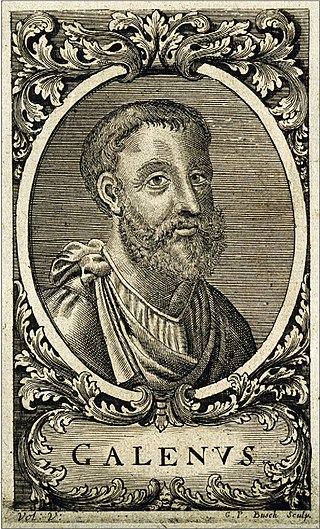
Aelius Galenus or Claudius Galenus, often anglicized as Galen or Galen of Pergamon, was a Roman Greek physician, surgeon and philosopher. Considered to be one of the most accomplished of all medical researchers of antiquity, Galen influenced the development of various scientific disciplines, including anatomy, physiology, pathology, pharmacology, and neurology, as well as philosophy and logic.

Hades, in the ancient Greek religion and mythology, is the god of the dead and the king of the underworld, with which his name became synonymous. Hades was the eldest son of Cronus and Rhea, although this also made him the last son to be regurgitated by his father. He and his brothers, Zeus and Poseidon, defeated their father's generation of gods, the Titans, and claimed joint rulership over the cosmos. Hades received the underworld, Zeus the sky, and Poseidon the sea, with the solid earth available to all three concurrently. In artistic depictions, Hades is typically portrayed holding a bident and wearing his helm with Cerberus, the three-headed guard-dog of the underworld, standing at his side.

Pergamon or Pergamum, also referred to by its modern Greek form Pergamos (Πέργαμος), was a rich and powerful ancient Greek city in Mysia. It is located 26 kilometres (16 mi) from the modern coastline of the Aegean Sea on a promontory on the north side of the river Caicus and northwest of the modern city of Bergama, Turkey.

In Greek mythology and ancient Greek religion, Mnemosyne is the goddess of memory and the mother of the nine Muses by her nephew Zeus. In the Greek tradition, Mnemosyne is one of the Titans, the twelve divine children of the earth-goddess Gaia and the sky-god Uranus. The term Mnemosyne is derived from the same source as the word mnemonic, that being the Greek word mnēmē, which means "remembrance, memory".

Asclepius is a hero and god of medicine in ancient Greek religion and mythology. He is the son of Apollo and Coronis, or Arsinoe, or of Apollo alone. Asclepius represents the healing aspect of the medical arts; his daughters, the "Asclepiades", are: Hygieia, Iaso, Aceso, Aegle and Panacea. He has several sons as well. He was associated with the Roman/Etruscan god Vediovis and the Egyptian Imhotep. He shared with Apollo the epithet Paean. The rod of Asclepius, a snake-entwined staff, remains a symbol of medicine today. Those physicians and attendants who served this god were known as the Therapeutae of Asclepius.
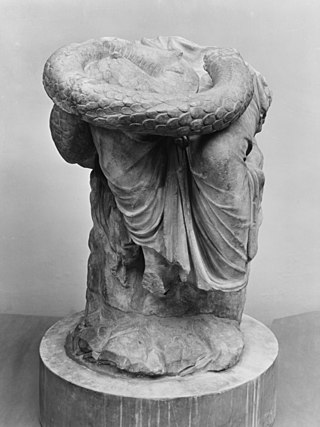
Hygieia is a goddess from Greek mythology. Hygieia is a goddess of health, cleanliness and hygiene. Her name is the source for the word "hygiene".
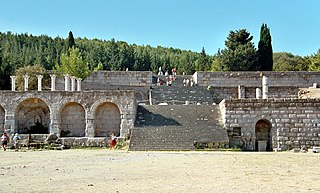
Asclepieia were healing temples in ancient Greece, dedicated to Asclepius, the first doctor-demigod in Greek mythology. Asclepius was said to have been such a skilled doctor that he could even raise people from the dead. So stemming from the myth of his great healing powers, pilgrims would flock to temples built in his honor in order to seek spiritual and physical healing.

Erasistratus was a Greek anatomist and royal physician under Seleucus I Nicator of Syria. Along with fellow physician Herophilus, he founded a school of anatomy in Alexandria, where they carried out anatomical research. As well, he is credited with helping to found the methodic school of teachings of medicine in Alexandria whilst opposing traditional humoral theories of Hippocratic ideologies. Together with Herophilus, he is credited by historians as the potential founder of neuroscience due to his acknowledgements of nerves and their roles in motor control through the brain and skeletal muscles.

Ariarathes V Eusebes Philopator was a son of the preceding king Ariarathes IV of Cappadocia and queen Antiochis. He was distinguished by his contemporaries for his excellence of his character and his cultivation of philosophy and the liberal arts and is considered by some historians to have been the greatest of the kings of Cappadocia.
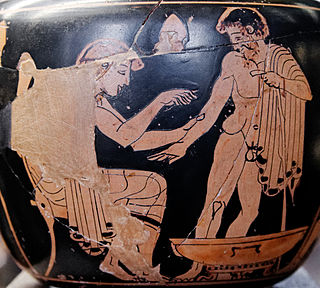
Ancient Greek medicine was a compilation of theories and practices that were constantly expanding through new ideologies and trials. The Greek term for medicine was iatrikē. Many components were considered in ancient Greek medicine, intertwining the spiritual with the physical. Specifically, the ancient Greeks believed health was affected by the humors, geographic location, social class, diet, trauma, beliefs, and mindset. Early on the ancient Greeks believed that illnesses were "divine punishments" and that healing was a "gift from the Gods". As trials continued wherein theories were tested against symptoms and results, the pure spiritual beliefs regarding "punishments" and "gifts" were replaced with a foundation based in the physical, i.e., cause and effect.
According to Shi'a scholars, Fatima Zahra was Muhammad's only daughter. The Sunni belief that he had other daughters by Khadijah denies Ali ibn Abu Talib the distinction of being Muhammad's only son-in-law. She is held in highest of esteem, as being the single most ideal example for all women; in terms of her purity and the eventual martyrdom of her son, she is considered to be the Muslim counterpart to the Christian Mary, mother of Jesus; indeed, one of her names is Maryam al-Kubrá, or "the greater Mary".

Medicine in ancient Rome was highly influenced by ancient Greek medicine, but also developed new practices through knowledge of the Hippocratic Corpus combined with use of the treatment of diet, regimen, along with surgical procedures. This was most notably seen through the works of two of the prominent Greek physicians, Dioscorides and Galen, who practiced medicine and recorded their discoveries. This is contrary to two other physicians like Soranus of Ephesus and Asclepiades of Bithynia, who practiced medicine both in outside territories and in ancient Roman territory, subsequently. Dioscorides was a Roman army physician, Soranus was a representative for the Methodic school of medicine, Galen performed public demonstrations, and Asclepiades was a leading Roman physician. These four physicians all had knowledge of medicine, ailments, and treatments that were healing, long lasting and influential to human history.
Sosipatra was a Neoplatonist philosopher and mystic who lived in Ephesus and Pergamon in the first half of the 4th century CE. The story of her life is told in Eunapius' Lives of the Sophists.
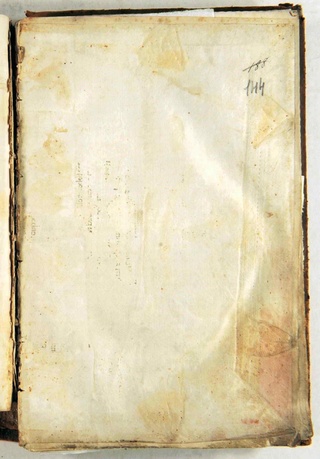
Dialogues of the Gods are 25 miniature dialogues mocking the Homeric conception of the Greek gods written in the Attic Greek dialect by the Syrian author Lucian of Samosata. There are 25 dialogues in total. The work was translated into Latin c. 1518 by Livio Guidolotto, the apostolic assistant of Pope Leo X.

Rafe Hernandez is a fictional character on Days of Our Lives, an American soap opera on the NBC network. Portrayed by Galen Gering and created by Dena Higley, Rafe is introduced in 2008 as the FBI agent assigned to protect the troublesome Sami Brady during her stay in witness protection. Sami and Rafe's contentious dynamic later develops into romance and the two fall in love and eventually marry. However, their romance is plagued by Sami's supercouple romance with Salem's resident badboy, EJ DiMera. Rafe's disdain for the DiMera family grows when he discovers that EJ is behind the kidnapping and presumed death of Sami's daughter Sydney and EJ's father Stefano replaces Rafe with a doppelganger. The series also introduces Rafe's younger sisters, Arianna and Gabi and later his younger brother Dario. Rafe is very protective of his siblings having helped raise them when their father abandoned the family. Rafe also has an affair with Kate Roberts putting him at odds with Stefano, Kate's ex-husband. He later falls in love with physical therapist Jordan Ridgeway whom he tries to help overcome her own dark past. In 2015, Rafe is forced to confront his past when his estranged father Eduardo resurfaces. Rafe later falls in love with his longtime colleague Hope Brady and supports her when she loses her true love to a brain tumor. When a grief-stricken Hope murders Stefano, Rafe helps her cover it up. Later storylines include raising Jordan's son, David, and his devastation when David's aunt gains custody of him, and developing a relationship with Ava Vitali.

In Greek mythology, Eurypylus ("Broadgate") was the son of Telephus, king of Mysia. He was a great warrior, who led a Mysian contingent that fought alongside the Trojans against the Greeks in the Trojan War. He killed Machaon, and was himself killed by Achilles' son Neoptolemus.
In Greek mythology, Callirrhoe was the daughter of the river god Achelous. She was betrothed of Alcmaeon, son of Amphiaraus of Argos, and mothered by him two sons, Amphoterus and Acarnan.
In Greek mythology, Arsinoe, sometimes spelled Arsinoë,, was the name of the following individuals.
On Passions, also translated as On Emotions or On Affections, is a work by the Greek Stoic philosopher Chrysippus dating from the 3rd-century BCE. The book has not survived intact, but around seventy fragments from the work survive in a polemic written against it in the 2nd-century CE by the philosopher-physician Galen. In addition Cicero summarises substantial portions of the work in his 1st-century BCE work Tusculan Disputations. On Passions consisted of four books; of which the first three discussed the Stoic theory of emotions and the fourth book discussed therapy and had a separate title—Therapeutics. Most surviving quotations come from Books 1 and 4, although Galen also provides an account of Book 2 drawn from the 1st-century BCE Stoic philosopher Posidonius. Little or nothing is known about Book 3.

In Greek mythology, Coronis is a Thessalian princess and a lover of the god Apollo. She was the daughter of Phlegyas, king of the Lapiths, and Cleophema. By Apollo she became the mother of Asclepius, the Greek god of medicine. While she was still pregnant, she slept with a mortal man named Ischys and was subsequently killed by the god for her betrayal. After failing to heal her, Apollo rescued their unborn child by performing a caesarean section. She was turned into a constellation after her death.